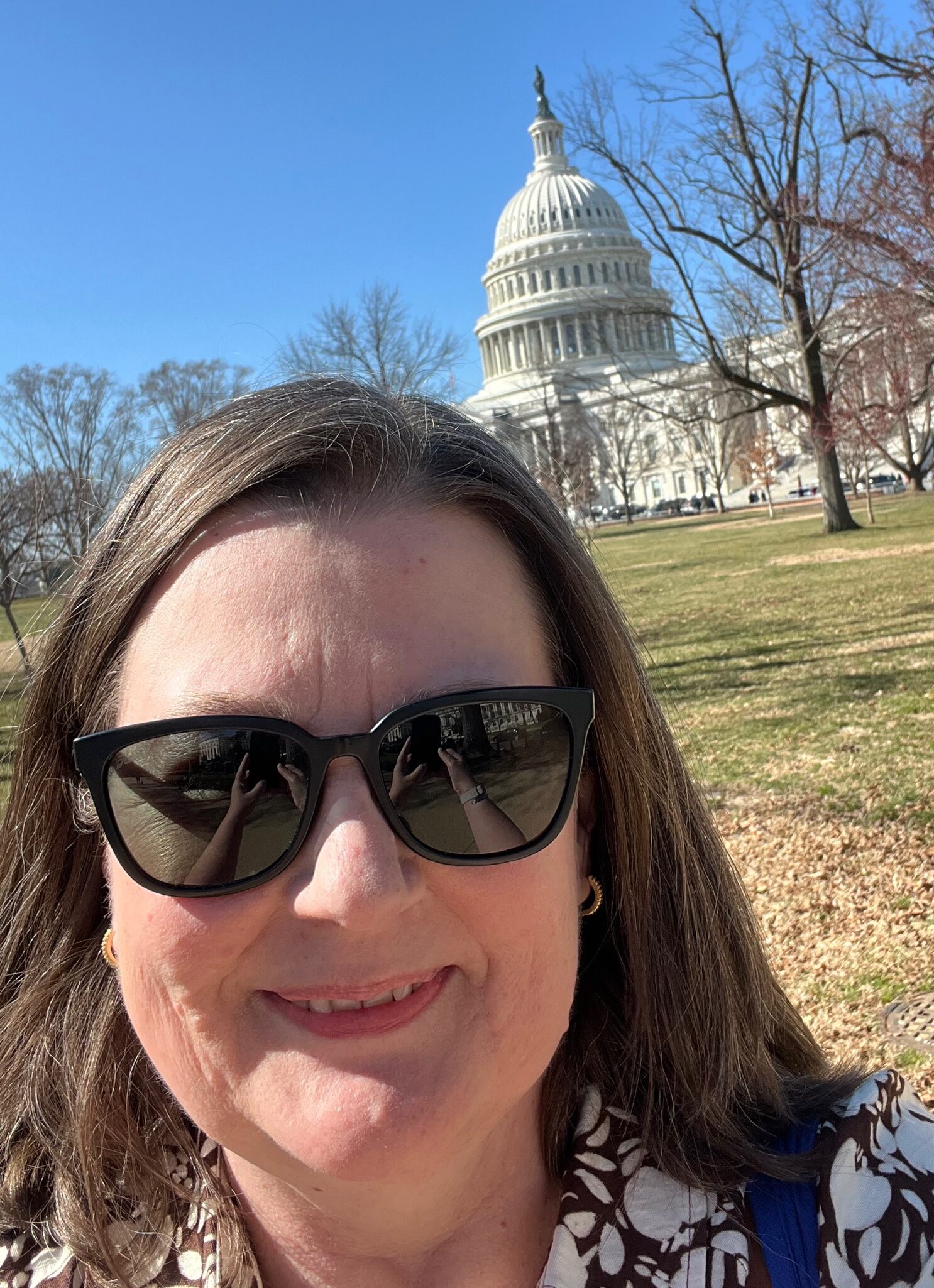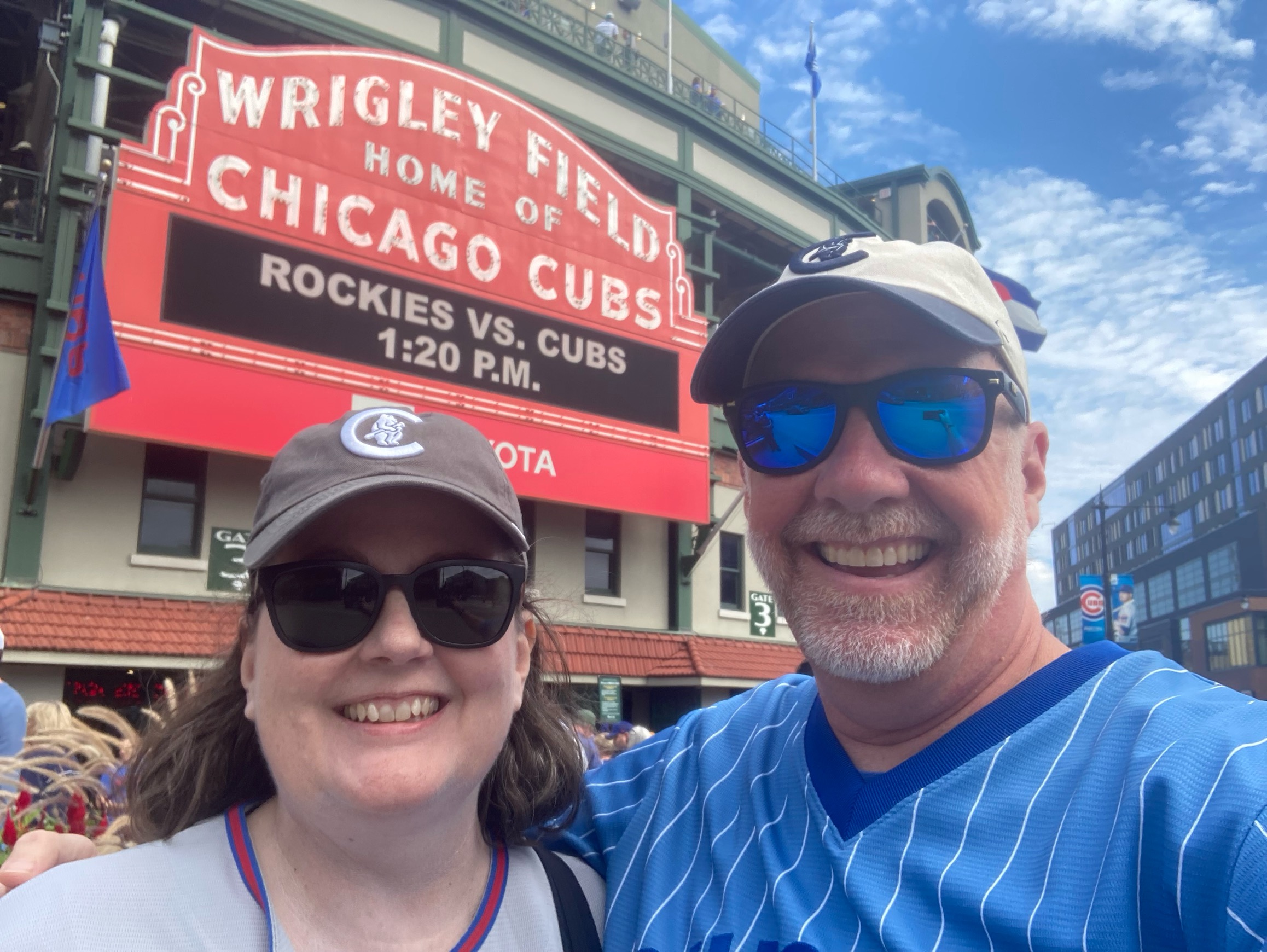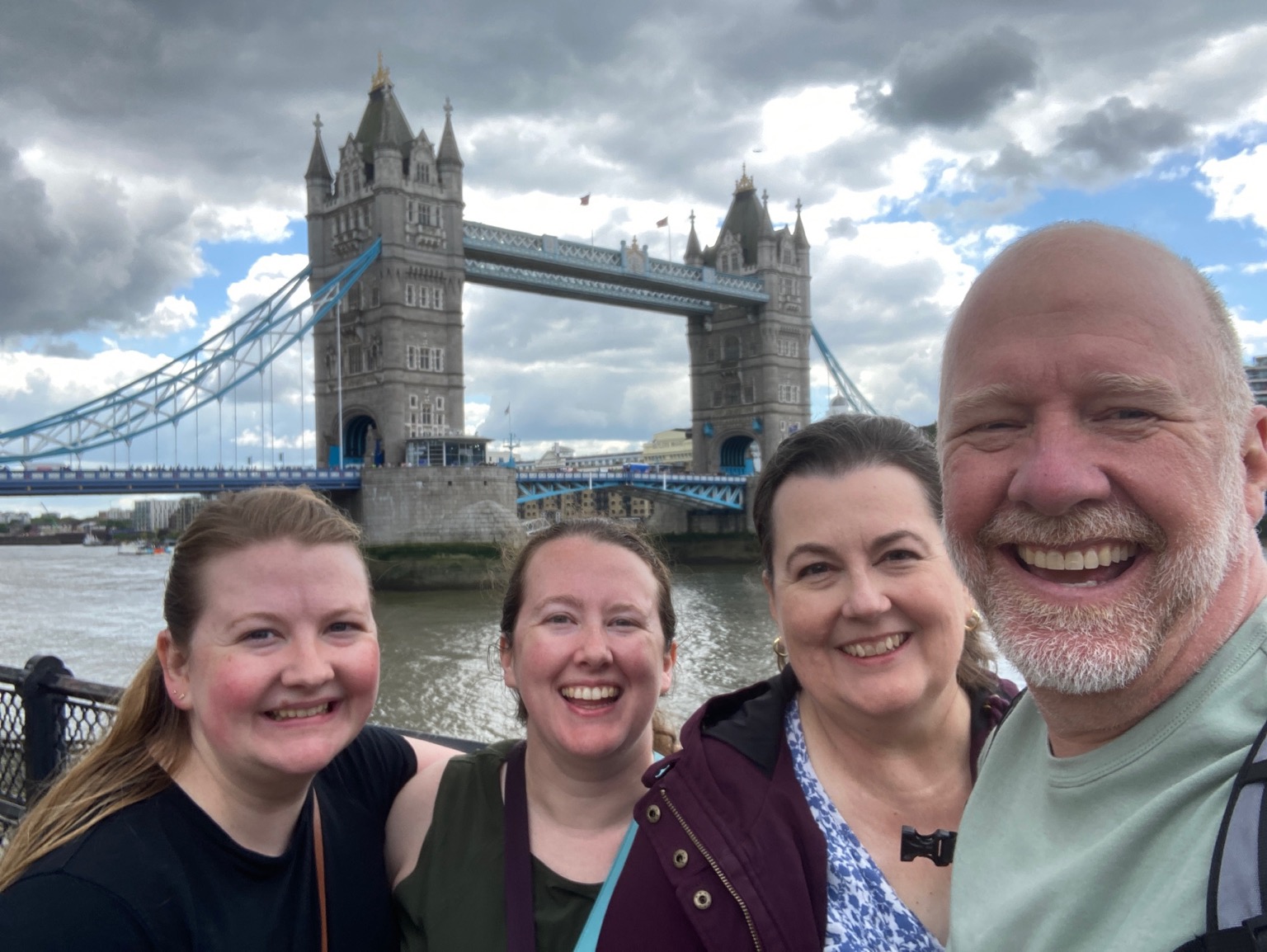Jill D. and her husband, Paul, live in Sycamore, IL with their beloved dog, Wrigley. Their 2 adult daughters live an hour away in Chicago. Jill works part time in the accounting department of her church. She loves to read, watch the Chicago Cubs, travel, and cheer on Team DeHaven as they run to raise funds for lung cancer research.
An unexpected diagnosis
In early 2021, after catching COVID-19, Jill noticed that she wasn’t bouncing back. Chest pain sent her to the emergency room, where a CT scan revealed something far more serious than lingering virus symptoms: a tumor in her right lung.
“When I first went to the ER, I thought it was my heart,” she recalls. “My father had a heart attack when he was young, so that seemed like a more likely possibility for me. But they did a scan, and based on that, the doctor said he thought I had cancer.”
A biopsy the next day confirmed it. Soon after, she learned the cancer had spread to her spine and neck. “I couldn’t wrap my head around that fact that I could have lung cancer. I hadn’t smoked, so lung cancer was absolutely not on my radar.”
Finding answers in ALK
Still reeling from the stage 4 (IV) diagnosis, Jill’s care team sent her biopsy for biomarker testing. A few days later, her oncologist called in the evening, this time with something like excitement in his voice. Jill’s lung cancer had the ALK-positive mutation.
“At the time I didn’t know what that meant, but I knew he was very happy about it,” Jill says. “He said, ‘If you have to have lung cancer, this is the one to have.’”
Jill started on a targeted therapy called Alecensa (alectinib). Within 3 months, scans showed a lot of improvement: her tumors had shrunk or disappeared. But the drug came with side effects. “It gave me severe fatigue,” she says. “Nights were completely off for me. I was in bed by 6 or 6:30 p.m.”
Progression and a new plan
In June 2024, after more than 2 years on alectinib, Jill’s scan showed progression. The original tumor was growing again, and new tumors had appeared. Repeat biomarker testing confirmed that the cancer was still ALK-positive, and her oncologist started her on Lorbrena (lorlatinib), another targeted therapy.
Again, Jill noticed a quick turnaround. “I started feeling better pretty quickly,” she says. “But lorlatinib comes with its own issues—my cholesterol and blood sugar almost immediately shot up.” Still, the tradeoff was worth it. At her most recent scan, Jill’s oncologist told her something she didn’t expect: her cancer was in remission.
“My husband and I just sat there in stunned silence,” Jill says. “I didn’t know this was even possible for me.”
Support at every step
Jill credits much of her emotional resilience through her diagnosis and treatment to the support she’s received from her family, community, and health care team. “My faith has been huge for me,” she says. “From the very beginning, my church family was right there, bringing us meals, praying, just holding us up.”
Jill also worked with a therapist for the first 2 years of her diagnosis, and she has had a palliative care nurse by her side since the beginning. “I call her my medical therapist,” Jill says. “She helps explain things to me and helps manage my pain and anxiety.” A referral to an oncology psychiatrist helped her better cope with the emotional toll of treatment, too. “All of these people have helped me to live a much better life with this disease.”
Family, advocacy, and finding her voice
 While Jill found strength in her community, her family found it by hitting the pavement—literally. Her husband and daughters, all runners, turned to fundraising through races as a way to process their grief and channel it into action. “It helped them emotionally,” Jill says. “It made them feel like they were doing something to help fight this.”
While Jill found strength in her community, her family found it by hitting the pavement—literally. Her husband and daughters, all runners, turned to fundraising through races as a way to process their grief and channel it into action. “It helped them emotionally,” Jill says. “It made them feel like they were doing something to help fight this.”
Her own advocacy journey also began through those races when she met people who work with and for organizations that support lung cancer. “I didn’t know anyone with lung cancer before that,” Jill says. “When I found GO2 for Lung Cancer, I just started reading everything I could on the website. That’s where I learned about the Lung Cancer Voices Summit, and when I attended, it was the first time I’d ever walked into a room full of people with lung cancer. I just sat there in awe.”
The experience changed her. Despite being an introvert, Jill enjoyed GO2’s advocacy day on Capitol Hill and felt empowered by sharing her story with legislators. “It was completely out of character for me,” she says, laughing. “To say, ‘This is serious, and you need to listen’, that was something I never thought I could do, but I am just so glad that I did. It was a very powerful experience.”
Hope, healing, and the power of storytelling
Jill knows she’s lucky to be able to be treated at a world-class cancer center just minutes from her home. She’s also painfully aware of how much education is still needed in the broader medical community. “I’ve had to explain my cancer to healthcare providers multiple times,” she says. “That’s one of the reasons I wanted to get more involved—to raise awareness and improve education about this disease.”
She also draws strength from staying informed. “Some people say, ‘don’t Google your diagnosis,’ but I did. And from there I read and learned as much as I could. I even watched an international conference on lung cancer a few months after my diagnosis, just to learn more. Doing this helped me feel more in control in a situation that felt so out of control at the time.”
These days, Jill’s hope is tangible. She’s working out regularly, meeting with a nutritionist, and staying on top of her health. “I read about a study that showed that exercise reduced recurrence in other cancers, and I thought—great! I can walk. I can bike. That gives me hope.”
Jill’s journey is unique, but her experience echoes that of so many others who are living with lung cancer. She’s part of a growing movement of survivors who are not only beating the odds but also changing the narrative around this disease.
“I hope my story helps someone else,” she says. “Whether it’s a newly diagnosed patient, a caregiver, or a policymaker, if sharing what I’ve been through helps someone else feel less alone or more empowered, then it’s all worth it.”
Your voice makes an impact. Learn how to advocate year-round from home with our online lung cancer advocacy toolkit.



Leave A Comment